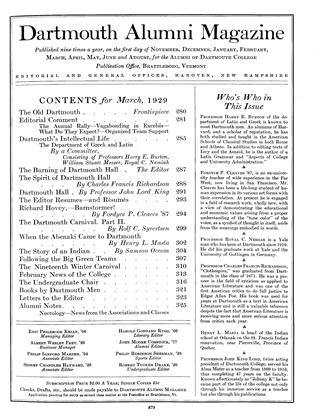By W. B. Drayton Henderson. New York: The Macmillan Company, 1928.
"If the time should ever come," said Wordsworth, foreseeing Professor Henderson's nativity, when surely the morning stars sang together, "If the time should ever come when what is now called science . . . shall be ready to put on a form of flesh and blood, the poet will lend his divine spirit to aid the trans- figuration." Poetry "is the impassioned expression which is in the countenance of all science."
Professor Henderson's epic poem, The NewArgonautica, goes far toward realizing Wordsworth's eloquent prophecy. For this truly epic attempt to record and interpret the spiritual questing of the modern world, relates the symbolical adventures of "the immortal spirits of Sir Walter Raleigh, Sir Francis Drake, Ponce de Leon, and Nunez da Vaca," as they voyage in their dream ship, Argo, among the stars. The poem's background is therefore astronomical, as true to science, we are told, as the astronomical textbooks to which Mr. Henderson alludes in his notes. The question arises, of course, has the poet felt and translated into terms of human passion the scientific meanings with which he works? There can be no doubt that Mr. Henderson has frequently done this: science puts on a form of flesh and blood in this poem, as in the ship's adventure with the Symplegades. That he has not always completely succeeded in humanizing his scientific materials is not important: he has frequently done so—has broken new poetic ground in verse that fires the imagination. No doubt this aspect of the poem will most delight the scientist. It should not frighten the ordinary reader.
But there can be no denying that this is a supremely difficult poem, packed full of subtle meanings, and of recondite allusions to history, fable, and scientific lore which necessitate constant reference to Mr. Henderson's notes—a poem which demands the most concentrated attention and prolonged study. Unfortunately perhaps, its necessary intrinsic obscurity is intensified by Mr. Henderson's syntactical eccentricities—these are many, ranging from simple inversions to sentences in which subject and object become difficult of detection. In other words, Mr. Henderson's style is highly mannered. But read the poem: you will find yourself borne up by passages which will leave you breathless and humble as in the presence of a great poet.
And this poem is greatly heartening: heartening because it has dared to choose the most difficult and vastest of themes—the interpretation and evaluation of our war-shaken age. (The poem "detaches from society one who is suffering from the distresses of our time, and against a background of stars brings him through darkness of soul to better light and being.") It is heartening because it is in the realest sense of the word original; because it is carried through with an ardor, a nobility of purpose, and a self-devotion truly magnificent; heartening, above all these reasons, because page after page kindles into glorious poetry.
The reviewer's space is limited: he ends by advising those who don't mind thinking when they read to get this poem. Others should leave it alone.
 View Full Issue
View Full Issue
More From This Issue
-
 Article
ArticleRichard Hovey,-Barnstormer!
March 1929 By Fordyce P. Cleaves '87 -
 Lettter from the Editor
Lettter from the EditorEditorial Comment
March 1929 -
 Article
ArticleThe Dartmouth Carnival
March 1929 By Rolf C. Syvertsen -
 Class Notes
Class NotesCLASS OF 1927
March 1929 By Doane Arnold -
 Class Notes
Class NotesCLASS OF 1914
March 1929 By John R. Burleigh -
 Article
ArticleThe Story of an Indian
March 1929 By Samson Occom
Books
-
 Books
BooksNotes on a rival of matrimony: the compromises, betrayals, and felicities of translation.
February 1977 -
 Books
BooksFaculty Publications
December 1934 By Harold G. Rugg -
 Books
BooksSPINDRIFT
November 1951 By Herbert F. West '22 -
 Books
BooksA CRITICAL INTRODUCTION TO ETHICS,
April 1949 By Maurice Mandelbaum '29. -
 Books
BooksTHE STORY OF BLINDNESS.
July 1956 By RALPH P. HOLBEN -
 Books
BooksSTANISLAS KONARSKI, REFORMER OF EDUCATION IN XVIIIth CENTURY POLAND
AUGUST 1929 By W. R. W.


